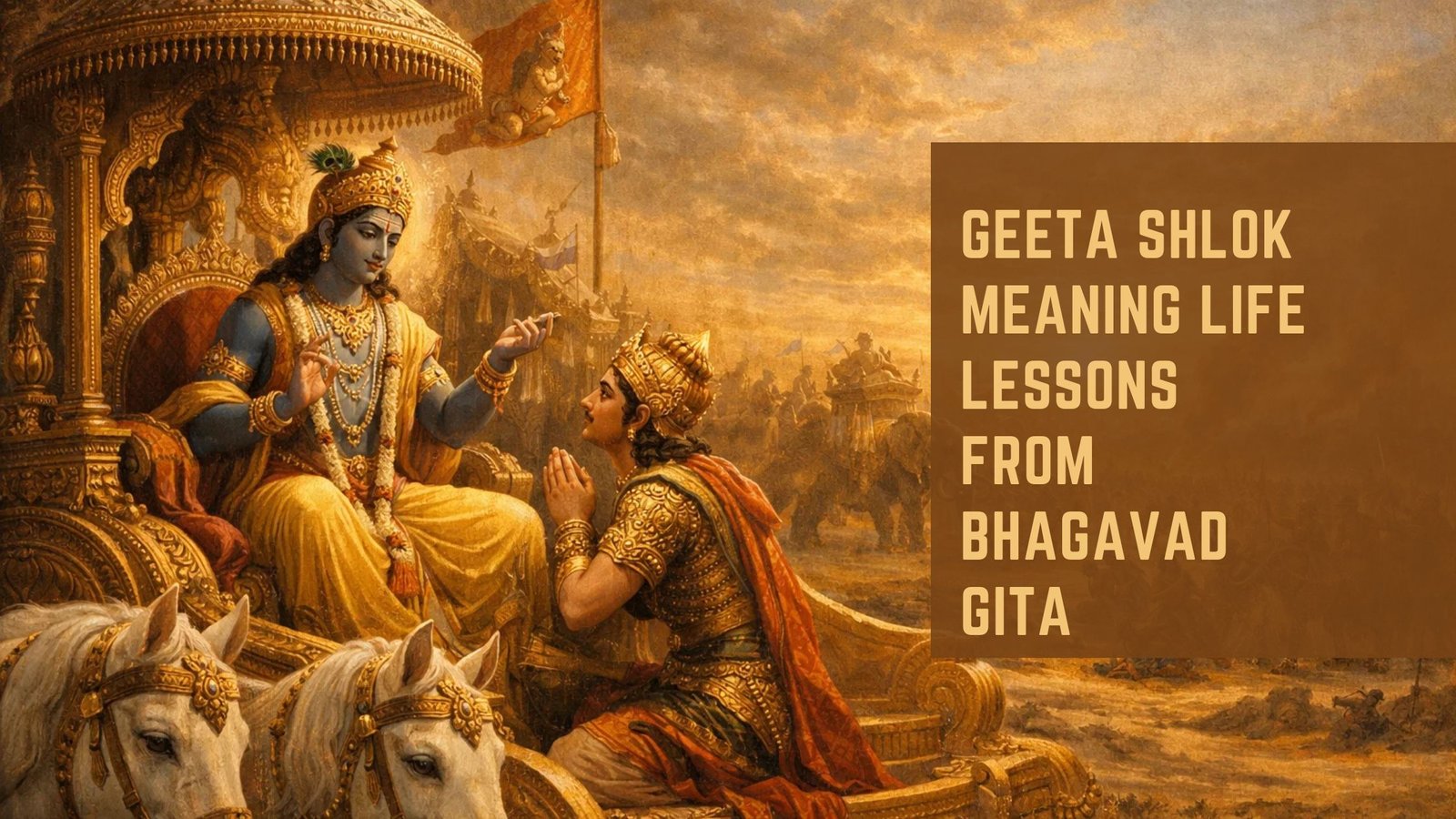The Bhagavad Gita, a revered text in Hindu philosophy, serves as a profound guide to understanding the complexities of life, duty, and spirituality. In Chapter 7, Verse 1, Lord Krishna imparts essential wisdom to Arjuna, emphasizing the importance of knowledge and the nature of reality. This verse marks a pivotal moment in the dialogue between the divine and the human, where Krishna reveals the significance of understanding both the material and spiritual realms.
The teachings encapsulated in this verse resonate with seekers of truth, offering insights that transcend time and culture. In this verse, Krishna begins by addressing the necessity of knowledge for spiritual growth. He articulates that true wisdom is not merely an accumulation of facts but a deep understanding of the self and the universe.
This introduction sets the stage for a deeper exploration of divine knowledge, inviting individuals to embark on a journey of self-discovery and enlightenment. The teachings of the Gita, particularly in this chapter, encourage individuals to look beyond the superficial aspects of existence and delve into the essence of life itself.
Key Takeaways
- Bhagavad Gita 7:1 introduces the concept of Divine Knowledge as a means to attain spiritual enlightenment and liberation.
- Divine Knowledge is the understanding of the eternal truth and the ultimate reality, leading to self-realization and inner peace.
- Seeking Divine Knowledge is significant as it helps individuals transcend material desires and attachments, leading to spiritual growth and fulfillment.
- A true seeker of Divine Knowledge possesses qualities such as humility, sincerity, and a genuine desire for self-improvement and spiritual evolution.
- The path to attaining Divine Knowledge involves self-discipline, introspection, and a deep understanding of the scriptures and teachings of enlightened beings.
Understanding the concept of Divine Knowledge
The Profound Understanding of Divine Knowledge
Divine knowledge, as presented in the Bhagavad Gita, encompasses a profound understanding of both the material and spiritual dimensions of existence. It is not limited to intellectual comprehension but extends to an experiential realization of one’s true nature and the interconnectedness of all beings.
The Nature of Reality and the Self
This knowledge reveals the underlying principles that govern life, offering insights into the nature of reality, the self, and the divine. It encourages individuals to recognize their place within the cosmic order and to understand their relationship with the Supreme Being.
A Transformative Power
At its core, divine knowledge is transformative. It has the power to shift one’s perspective from a limited, ego-centric view to a broader understanding of existence. This shift allows individuals to transcend their fears, desires, and attachments, leading to a state of inner peace and fulfillment.
A Universal Truth
The Gita emphasizes that such knowledge is accessible to all who earnestly seek it, regardless of their background or circumstances. It is a universal truth that invites individuals to awaken to their higher selves and embrace their spiritual potential.
The significance of seeking Divine Knowledge

The pursuit of divine knowledge holds immense significance in an individual’s spiritual journey. In a world often clouded by distractions and material pursuits, seeking this higher understanding becomes a beacon of hope and clarity. Divine knowledge serves as a guiding light, illuminating the path toward self-realization and liberation from the cycle of birth and death.
It empowers individuals to navigate life’s challenges with wisdom and grace, fostering resilience in the face of adversity. Moreover, seeking divine knowledge cultivates a sense of purpose and meaning in life. It encourages individuals to look beyond transient pleasures and superficial achievements, prompting them to explore deeper questions about existence and their role in the universe.
This quest for understanding fosters a connection with the divine, nurturing a sense of belonging to something greater than oneself. As individuals engage in this pursuit, they often find themselves transformed, developing qualities such as compassion, humility, and inner strength.
The qualities of a true seeker of Divine Knowledge
| Qualities | Description |
|---|---|
| Humility | A true seeker of Divine Knowledge approaches learning with a humble and open mindset, recognizing that there is always more to learn. |
| Patience | Seeking Divine Knowledge requires patience, as it often takes time and effort to truly understand and internalize spiritual teachings. |
| Open-mindedness | Being open-minded allows a seeker to consider different perspectives and interpretations of Divine Knowledge, fostering a deeper understanding. |
| Discipline | Discipline is essential for a seeker to consistently engage in spiritual practices and study, allowing for continuous growth and development. |
| Compassion | A true seeker of Divine Knowledge embodies compassion, recognizing the interconnectedness of all beings and the importance of empathy and kindness. |
A true seeker of divine knowledge embodies specific qualities that facilitate their spiritual growth. First and foremost is sincerity; an earnest desire to understand oneself and the nature of reality is essential for anyone embarking on this journey. This sincerity drives individuals to question their beliefs, confront their limitations, and remain open to new insights.
It is this genuine quest for truth that lays the foundation for deeper understanding. In addition to sincerity, humility plays a crucial role in the life of a seeker. Recognizing one’s limitations and acknowledging that there is always more to learn fosters an attitude of receptivity.
A humble seeker approaches knowledge with an open heart and mind, ready to absorb wisdom from various sources. Furthermore, perseverance is vital; the path to divine knowledge can be fraught with challenges and obstacles. A true seeker remains steadfast in their pursuit, undeterred by setbacks or doubts.
The path to attaining Divine Knowledge
Attaining divine knowledge is often described as a journey rather than a destination. This path involves various practices that nurture spiritual growth and understanding. One fundamental aspect is self-inquiry—an introspective examination of one’s thoughts, emotions, and motivations.
Through self-inquiry, seekers can uncover layers of conditioning that obscure their true nature, allowing them to align more closely with their authentic selves. Meditation also plays a pivotal role in this journey. By quieting the mind and turning inward, individuals can access deeper states of consciousness where divine knowledge resides.
Meditation fosters clarity and insight, enabling seekers to connect with their inner wisdom and experience moments of profound realization. Additionally, engaging in study—whether through sacred texts or teachings from enlightened beings—provides seekers with valuable guidance and inspiration along their path.
The role of faith and devotion in acquiring Divine Knowledge

Faith and devotion are integral components in the quest for divine knowledge. Faith acts as a catalyst that propels seekers forward on their spiritual journey. It instills confidence in the process and encourages individuals to trust in the unfolding of their experiences.
This trust allows seekers to surrender their fears and doubts, opening themselves up to receive wisdom from higher sources. Devotion complements faith by fostering a deep connection with the divine. When seekers cultivate devotion through practices such as prayer or worship, they create an environment conducive to receiving divine guidance.
This heartfelt connection nurtures love and reverence for the divine presence within themselves and all beings. As seekers deepen their faith and devotion, they often find that divine knowledge becomes more accessible, revealing itself in moments of clarity and insight.
Applying Divine Knowledge in daily life
The application of divine knowledge in daily life is where its true power manifests. It is not enough for seekers to merely acquire knowledge; they must integrate it into their actions, thoughts, and interactions with others. This integration transforms mundane experiences into opportunities for growth and learning.
By embodying principles such as compassion, non-attachment, and equanimity, individuals can navigate life’s challenges with grace and wisdom. Moreover, applying divine knowledge fosters harmonious relationships with others. When individuals approach interactions with an understanding of interconnectedness, they are more likely to act with kindness and empathy.
This shift in perspective can lead to more meaningful connections and contribute to a sense of community and belonging. Ultimately, living according to divine knowledge enriches not only one’s own life but also positively impacts those around them.
Embracing the wisdom of Bhagavad Gita 7:1
In conclusion, Bhagavad Gita 7:1 serves as a profound reminder of the importance of seeking divine knowledge in one’s spiritual journey. The teachings encapsulated within this verse encourage individuals to embark on a quest for understanding that transcends mere intellectual pursuits. By embracing sincerity, humility, faith, and devotion, seekers can navigate the path toward self-realization and liberation.
As individuals apply divine knowledge in their daily lives, they contribute to a more compassionate and harmonious world.
In doing so, they not only enrich their own lives but also illuminate the path for others on their journey toward enlightenment.
In Chapter 7, Verse 1 of the Bhagavad Gita, Lord Krishna reveals his divine nature to Arjuna. This verse sets the stage for the profound teachings that follow in the rest of the chapter. For further insights into the timeless wisdom of the Bhagavad Gita, you may want to read the article “The Bhagavad Gita: A Timeless Guide to Life” available at this link. This article delves into the significance of the Gita as a practical guide for navigating life’s challenges and finding inner peace.
FAQs
What is the Bhagavad Gita?
The Bhagavad Gita is a 700-verse Hindu scripture that is part of the Indian epic Mahabharata. It is a sacred text of the Hindu religion and is considered one of the most important spiritual classics.
What is Chapter 7, Verse 1 of the Bhagavad Gita about?
Chapter 7, Verse 1 of the Bhagavad Gita is the beginning of the seventh chapter, in which Lord Krishna explains the nature of his divine manifestations and the importance of understanding them.
What is the significance of Chapter 7, Verse 1 in the Bhagavad Gita?
Chapter 7, Verse 1 sets the stage for Lord Krishna’s teachings on the different manifestations of the divine and the importance of understanding them for spiritual growth and enlightenment.
How is the Bhagavad Gita relevant today?
The Bhagavad Gita addresses universal themes such as duty, righteousness, and the nature of existence, making it relevant to people of all backgrounds and beliefs. Its teachings on selflessness and devotion continue to inspire and guide individuals in their spiritual journeys.














